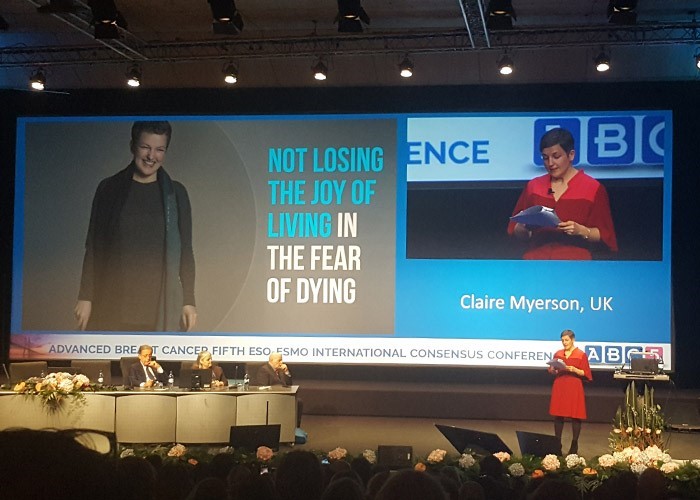Our Clinical Nurse Specialist Catherine Priestley highlights some themes from the 2019 International Consensus Conference for Advanced Breast Cancer (ABC) in Lisbon.
Our Clinical Nurse Specialist Catherine Priestley highlights some themes from the 2019 International Consensus Conference for Advanced Breast Cancer (ABC) in Lisbon.

As Clinical Nurse Specialist for Secondary Breast Cancer at Breast Cancer Now, I was fortunate enough to attend the ABC5 conference for the third time.
ABC is a major international conference for advanced or secondary breast cancer.
It brings together healthcare professionals and patient advocates. Patient advocates are people who promote the needs and concerns of patients, and many of those at the conference had secondary breast cancer.
The conference reviews current evidence on the use of existing or new treatments. And it develops guidelines for treating people with secondary breast cancer.
There are also sessions which look at maintaining quality of life, managing side effects of treatment and helping empower patients to live well.
While it’s smaller than other international cancer conferences, attendance has increased over the five meetings held to date. This year’s conference was attended by around 1,500 people.
A valuable message
The conference was opened by Claire Myerson, who is living with secondary breast cancer.
She told her own story of receiving a diagnosis and ongoing treatment for secondary breast cancer, and the support she has accessed, including our own Living with Secondary Breast Cancer meet-ups.
Claire challenged the oncologists in the audience to treat their patients according to what is important to them as individuals, and not to treat the disease without this in mind.
The session was well received and provoked much positive discussion about its valuable message.
New developments in treatment
There were medical sessions to review existing and new evidence on ways of treating certain types of secondary breast cancer, including triple negative, hormone receptor positive and HER2 positive cancers.
There was also discussion about new drugs that are starting to come into use across the world.
For example, atezolizumab is a type of immunotherapy. Immunotherapy helps the immune system to recognise and attack cancer cells. Some cancer cells have a higher than normal level of a protein called PD-L1, which stops the immune system from attacking these cells. Atezolizumab blocks PD-L1, allowing the immune system to recognise and destroy these breast cancer cells. It also offers a new treatment option to some people with triple negative breast cancer.
A drug called alpelisib has been developed to treat people with a particular genetic mutation. A mutation is like a spelling mistake in your DNA. The PIK3CA mutation, which is not inherited, has been linked to cancer growth in some people. Alpelisib is suitable for people with hormone receptor positive, HER2 negative, PIK3CA-mutated secondary breast cancer.
These drugs are not currently routinely available on the NHS.
Living with secondary breast cancer
The advocacy sessions provided an opportunity to discuss thought-provoking topics such as the use of complementary therapies alongside newer treatments and the pitfalls of doing this without discussing it with the oncology team first.
The programme also included some incredibly valuable sessions on having difficult conversations with family, strategies for communication at the end of life, and improving patients’ communication skills to help them get the most from healthcare professional teams.
Creating up-to-date guidance
Having reviewed up-to-date research and practice, on the last day of the conference a panel of around 40 faculty members discussed the strength of the evidence they had heard.
They then voted on changes to update the International Consensus Guidelines for Advanced Breast Cancer. These guidelines are used by many oncologists in the UK to help guide their decisions about treatment.
This important element of the meeting ensures oncologists across the world have access to the best and most up-to-date guidance on how to treat their patients.
Crucially, it also gives evidence to those campaigning to improve the care of people with a diagnosis, which they can take to their policy makers to drive change and improve access to specialist treatments.
You can read the current ABC4 guidelines. The updated ABC5 guidelines will be released in 2020.
We have information about secondary breast cancer, including symptoms, treatments and life after a diagnosis.